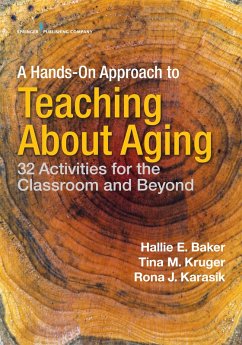
Psychology of Aging 101 (eBook, ePUB)

PAYBACK Punkte
16 °P sammeln!
A reader-friendly overview of geropsychology based on a wealth of evidence-based research Written by a renowned scholar and practitioner of gerontology and aging, this is a concise, reader-friendly overview of key concepts of geropsychology, the psychology of aging. Grounded in positive psychology, the text dispels common myths about the aging population with a wealth of evidence-based research. It encompasses a foundational knowledge base regarding issues unique to older adults, information that is essential for mental health providers, who already see an unprecedented growth in the number of...
A reader-friendly overview of geropsychology based on a wealth of evidence-based research
Written by a renowned scholar and practitioner of gerontology and aging, this is a concise, reader-friendly overview of key concepts of geropsychology, the psychology of aging. Grounded in positive psychology, the text dispels common myths about the aging population with a wealth of evidence-based research. It encompasses a foundational knowledge base regarding issues unique to older adults, information that is essential for mental health providers, who already see an unprecedented growth in the number of older adults in their practices--a trend that is expected to continue for years to come.
The text discusses theoretical models underlying geropsychology, and examines common difficulties that affect older adults along with the most effective treatment approaches for this population. With a focus on the strengths and functions of older adults, the text examines the unique psychological problems of later life and conflicts caused by retirement, living longer, financial stressors, and chronic illness. It discusses the complications of changing family systems, coping with cognitive impairments, how psychologists understand and treat Alzheimer's and dementia patients, older adult sexuality including the unique sexual problems confronting LGBT individuals, elder abuse, ageism, substance abuse, and issues surrounding death and dying. A chapter on future directions for psychological research and practice highlights the many opportunities available in this field. The text will be of value for upper-level undergraduate courses on the psychology of aging, as a supplement to developmental and clinical psychology courses, and as a resource for interdisciplinary studies with a focus on gerontology.
.
Key Features:
Written by a renowned scholar and practitioner of gerontology and aging, this is a concise, reader-friendly overview of key concepts of geropsychology, the psychology of aging. Grounded in positive psychology, the text dispels common myths about the aging population with a wealth of evidence-based research. It encompasses a foundational knowledge base regarding issues unique to older adults, information that is essential for mental health providers, who already see an unprecedented growth in the number of older adults in their practices--a trend that is expected to continue for years to come.
The text discusses theoretical models underlying geropsychology, and examines common difficulties that affect older adults along with the most effective treatment approaches for this population. With a focus on the strengths and functions of older adults, the text examines the unique psychological problems of later life and conflicts caused by retirement, living longer, financial stressors, and chronic illness. It discusses the complications of changing family systems, coping with cognitive impairments, how psychologists understand and treat Alzheimer's and dementia patients, older adult sexuality including the unique sexual problems confronting LGBT individuals, elder abuse, ageism, substance abuse, and issues surrounding death and dying. A chapter on future directions for psychological research and practice highlights the many opportunities available in this field. The text will be of value for upper-level undergraduate courses on the psychology of aging, as a supplement to developmental and clinical psychology courses, and as a resource for interdisciplinary studies with a focus on gerontology.
.
Key Features:
- Provides a concise overview of one of the largest growing segments of our population
- Written by a prominent expert in gerontology and psychology
- Offers a wealth of evidence-based research that informs clinical issues
- Grounded in a positive psychology approach
- Integrates theory with human rights and social justice
Dieser Download kann aus rechtlichen Gründen nur mit Rechnungsadresse in A, D ausgeliefert werden.













